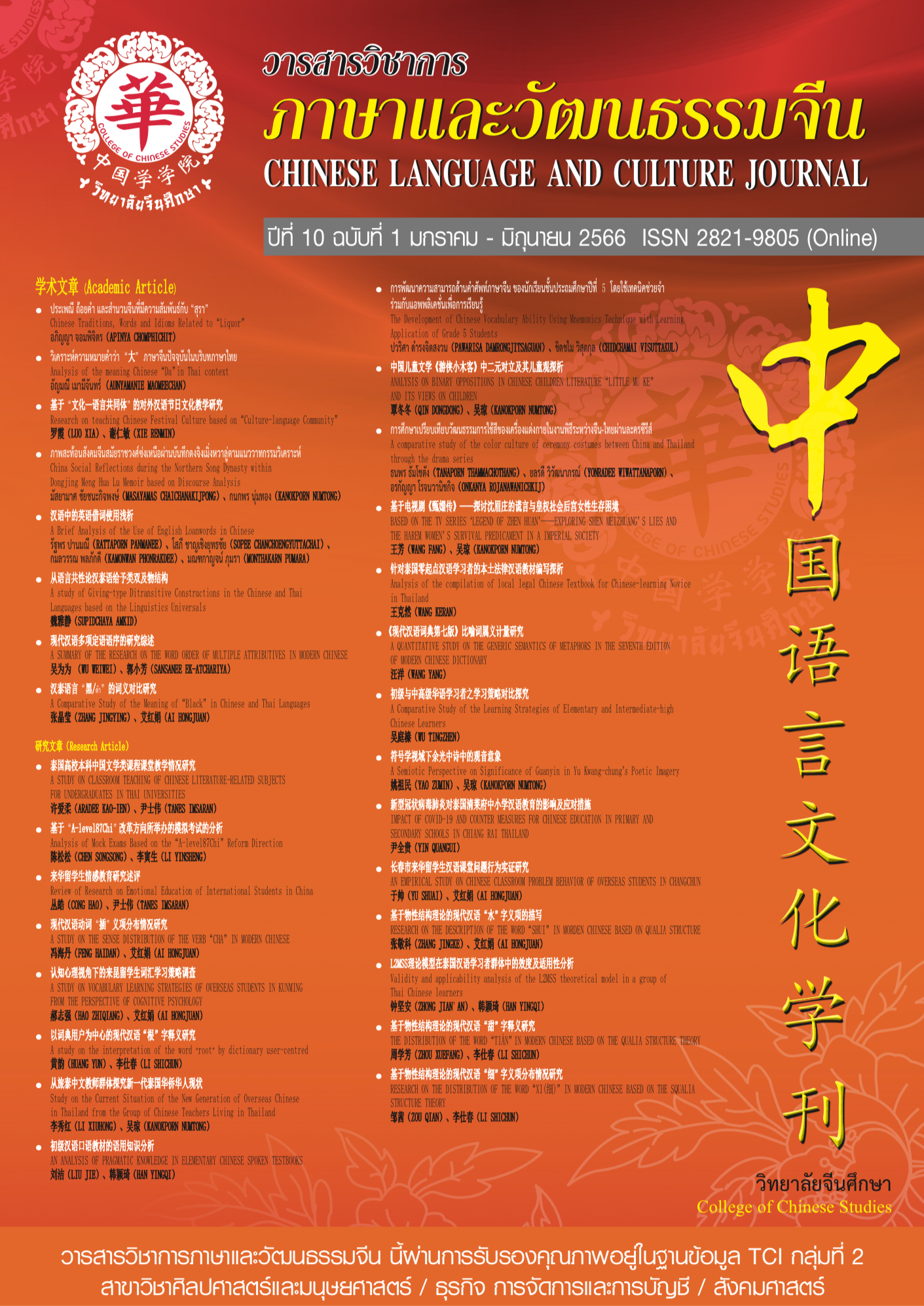The Development of Chinese Vocabulary Ability Using Mnemonics Technique with Learning Application of Grade 5 Students
Keywords:
Chinese vocabulary ability, Retention of word memorization, Mnemonic technique, Learning applicationAbstract
The purposes of this research article were 1) to compare the Chinese vocabulary ability of students before and after using mnemonic techniques with a learning application; 2) to investigate the retention of Chinese word memorization of students before and after using mnemonic techniques with a learning application; and 3) to investigate the attitudes of students toward the use of mnemonic techniques with a learning application. The sample of the study consisted of fifth-graders in the first semester of the academic year 2022 at a private school in the province of Kanchanaburi. In the study, cluster random selection was utilized, resulting in one classroom with 44 students. The study instruments comprised 1) six lesson plans, 2) a multiple-choice test of Chinese vocabulary ability with four options, and 3) an interview to determine students' perspectives on mnemonic techniques for learning application. Mean, standard deviation, t-test for dependent samples, and content analysis were used to examine the data. The results revealed that 1) The students' Chinese vocabulary ability after using mnemonic techniques with learning application was significantly higher than before learning at .01 level; 2) The students' retention of Chinese vocabulary after two weeks of using mnemonic techniques with learning application increased by 5.17 %; and 3) the majority of the students interviewed liked and enjoyed using mnemonic techniques with learning application to learn and improve the ability of Chinese vocabulary.
References
กระทรวงศึกษาธิการ. (2556) หลักสูตรแกนกลางการศึกษาขั้นพื้นฐาน พุทธศักราช 2551 กลุ่มสาระการเรียนรู้ภาษาต่างประเทศ. กรุงเทพมหานคร : สำนักงานคณะกรรมการส่งเสริมสวัสดิการและสวัสดิภาพครูและบุคคลากรทางการศึกษา.
จักรกฤษณ์ โพดาพล. (2563) การจัดการเรียนรู้ออนไลน์: วีถีที่เป็นไปทางการศึกษา. เข้าถึงได้จาก https://slc.mbu.ac.th/wp-content/uploads/2020/06/การจัดการเรียนรู้ออนไลน์-ดร.จักรกฤษณ์-โพด.pdf
จันทนา บรรจงดิษฐ์, สมาน เอกพิมพ์ และพุทธารัตน์ ทะสา. (2558) การพัฒนาความสามารถภาษาจีนเพื่อการ
สื่อสารโดยใช้หนังสืออิเล็กทรอนิกส์. ใน การประชุมวิชาการและนำเสนอผลงานวิจัยระดับชาติและนานาชาติ ครั้งที่ 6 (น. 65-73). มหาสารคาม: มหาวิทยาลัยราชภัฏมหาสารคาม.
ธีร์วรา ปลาตะเพียนทอง และภัทร์ธีรา เทียนเพิ่มพูล. (2563) การพัฒนาผลสัมฤทธิ์การเรียนรู้ด้านคำศัพท์และความคงทนโดยใช้เทคนิคช่วยจำร่วมกับสมุดภาพคำศัพท์สำหรับนักเรียนชั้นประถมศึกษาปีที่ 6 โรงเรียนอนุบาลนครปฐม. วารสารสหวิทยาการมนุษยศาสตร์และสังคมศาสตร์, 3(3), 534-547
นุชรี นามราช และสุรชัย ปิยะนุกุล. (2554) The Development of Instructional Packages in English Grammar on Conditional Sentences for the 10th Grade Students. เข้าถึงได้จาก https://studylib.net/doc/7560099/the-development-of-instructional-packages-in-english-grammar
ปัญจลักษณ์ ถวาย. (2556) การศึกษาผลสัมฤทธิ์และความคงทนในการจำคำศัพท์ภาษาอังกฤษของนักเรียน
ชั้นประถมศึกษาปีที่ 5 โรงเรียนประถมสาธิตมหาวิทยาลัยราชภัฏบ้านสมเด็จเจ้าพระยาที่เรียนโดยใช้แบบฝึกกิจกรรมเพิ่มพูนคำศัพท์ร่วมกับการอ่าน. วิทยานิพนธ์ ศศ.ม. (การสอนภาษาอังกฤษในฐานะภาษาต่างประเทศ) กรุงเทพมหานคร : บัณฑิตวิทยาลัย มหาวิทยาลัยศิลปากร.
พิมพร วัฒนากมลกุล,และมโนรัตน์ สมคะเนย์. (2564) การพัฒนาทักษะการเรียนรู้คำศัพท์ภาษาจีนโดยใช้เกมผ่านแอพพลิเคชั่น. Research and Development Journal Suan Sunandha Rajabhat University, 13(1),98-109.
รณพล มาสันติสุข. (2551) การเรียนการสอนภาษาจีนในประเทศไทยระดับประถม-มัธยมศึกษา. กรุงเทพมหานคร : ศูนย์จีนศึกษา สถาบันเอเชียศึกษา.
ศุภราภรณ์วงศ์ชัชวาลย์. (2559) การพัฒนาความรู้ดานคำศัพท์ภาษาอังกฤษ และความสามารถด้านการฟังภาษาอังกฤษ โดยวิธีการสอนแบบตอบสนองด้วยท่าทาง (The Total Physical Response: TPR) ของนักเรียนชั้นประถมศึกษาปีที่ 2 โรงเรียนบ้านสบพลึง จังหวัดลำปาง. วิทยานิพนธ์ ศศ.ม. (ภาษาอังกฤษ) พะเยา: คณะศิลปศาสตร์ มหาวิทยาลัยพะเยา.
สำนักงานสภาพัฒนาการเศรษฐกิจและสังคมแห่งชาติ. (2563) ยุทธศาสตร์ชาติ พ.ศ. 2561-2580 (ฉบับย่อ). เข้าถึงได้จาก https://www.nesdc.go.th/download/document/SAC/NS_SumPlanOct2018.pdf
เหงียน ถิ หญือ อี๊. (2556) การใช้เกมคำศัพท์เพื่อพัฒนาการเรียนรู้คำศัพท์ภาษาไทยของนักศึกษาชั้นปีที่ 1 มหาวิทยาลัยสังคมศาสตร์และมนุษยศาสตร์ นครโฮจิมินห์ สาธารณรัฐสังคมนิยมเวียดนาม. สารนิพนธ์ ศศ.ม. (การสอนภาษาไทยในฐานะภาษาต่างประเทศ). กรุงเทพมหานคร : มหาวิทยาลัยศรีนครินทรวิโรฒ.
อภิสรา พรรัตนานุกูล,และโจว คัง. (2562) การศึกษาสภาพปัจจุบันของรูปแบบการเรียนการสอนภาษาแบบเน้นงานปฏิบัติกับการสอนภาษาจีนสำหรับผู้เรียนชาวไทย. วารสารจีนศึกษา มหาวิทยาลัยเกษตรศาสตร์, 12(1), 140-162.
Ebbinghaus, H. (1913) Memory: A contribution to experimental psychology. (H. A. Ruger & C. E. Bussenius, Trans.). Teachers College Press. https://doi.org/10.1037/10011-000
Hello Chinese เรียนภาษาจีน. (2022) Hello Chinese learning chinese. [Online] Available : https://apps.apple.com/th/developer/hellochinese-technology-co-ltd/id1001507515?l=th
Huanarom, Y. (2018) Mobile application for teaching elementary Chinese [Special section]. Panyapiwat Journal, 10, 305 - 315.
MGR Online. (6 May 2015) "5 เทคนิคการจำแบบ อัลเบิร์ต ไอน์สไตน์ (info)" MGR Online. [Online] Available : https://mgronline.com/live/detail/9580000051827 (15 August 2022)
Wyra, M., Lawson, M. J., & Hungi, N. (2007) The Mnemonic Keyword Method: The Effects of Bidrectional Retrieval Training and of Ability to Image on Foreign Language Vocabulary Recall. Learning and Instruction, 17(3), 360-371.
Zhao, M. (2012) Chinese vocabulary Teaching of Thai college student based on memory staegies. (Thesis of Master Degree) Teaching to Speaker of Other Languages. College of international education. Shandong University.
Downloads
Published
How to Cite
Issue
Section
License
Copyright (c) 2023 Chinese Language and Culture Journal

This work is licensed under a Creative Commons Attribution-NonCommercial-NoDerivatives 4.0 International License.
บทความที่ได้รับการตีพิมพ์เป็นลิขสิทธิ์ของวารสารภาษาและวัฒนธรรมจีน มหาวิทยาลัยหัวเฉียวเฉลิมพระเกียรติ
บทความใน “วารสารวิชาการภาษาและวัฒนธรรมจีน” เป็นทรรศนะของผู้เขียนโดยเฉพาะ กองบรรณาธิการไม่มีส่วนในความคิดเห็นในข้อเขียนเหล่านั้น




